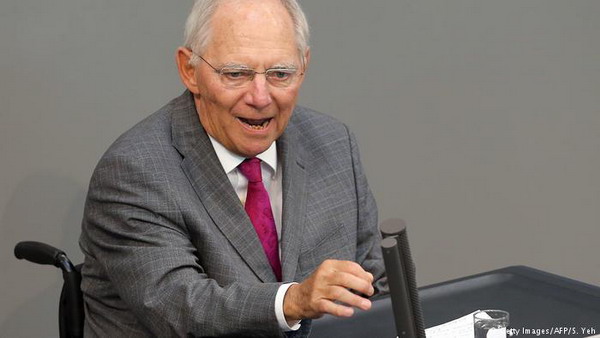Deutsche Welle. In an interview with “Bild” newspaper, Germany’s influential conservative finance minister, Wolfgang Schäuble, became the latest politician to wade into the fray of deteriorating relations between Ankara and Berlin.
“Turkey has started making arbitrary arrests and isn’t maintaining the minimum standards for consulates (having access to detainees),” Schäuble said. “It reminds me of how things were in the (communist) GDR. People who traveled there knew: If something happens, no one can help you.”
Schäuble’s remarks came one day after Germany changed its travel advisory for Turkey to warn German citizens of “risks” associated with going to the country. That move was part of a general “reorientation” of policy toward Turkey in response to Turkey’s jailing of German human rights activists and journalists.
“If Turkey doesn’t stop playing this little game, we’ll have to tell people: ‘You travel at your own risk to Turkey – we can’t offer you any guarantees,'” Schäuble added.
Vacation from the rule of law?
Turkey is a major tourist destiny for Germans, and Berlin hopes that the threat of lost income will get Ankara to release its citizens. The change in the travel advisory had many Germans asking whether it was okay to travel to Turkey for a vacation, and leading Social Democrats also used Bild, the country’s biggest tabloid, as a megaphone to weigh in on the issue.
“People have to answer that question for themselves,” said German Justice Minister Heiko Maas. “But they need to be clear about the fact that those who travel to Turkey are unfortunately not spending their holidays in a state governed by the rule of law.”
Those sentiments were seconded by the government’s Social Democratic integration commissioner Aydan Özoguz, who herself has Turkish roots.
“I would never have imagined that Turkey would become so incalculable,” Özoguz said. “Who can just go ahead and enjoy a vacation while others are being arbitrarily arrested?”
But Bundestag Vice-President Claudia Roth of the Greens said that she would be going to Turkey this summer.
“I can understand why some people might hesitate and possible decide against visiting the country,” Roth said. “But Turkey isn’t just Erdogan. That’s why I made the decision not to let myself be prevented from visiting my friends in Turkey.”
Arms sales under review
Also on Friday, Germany’s Economy Ministry said that Berlin would be reviewing all future exports of weapons to Turkey, which like Germany is a member of NATO.
“Special weight” was being given to “the current situation and particularly respect for human rights,” a ministry spokesperson said in a statement. The spokesperson added that since the failed military coup in Turkey in July 2016, permission to export arms to Turkey had only been given “after very differentiated and careful review of individual cases.”
There was no indication that the announcements would affect any already agreed upon deals for arms. In 2016, Germany approved the sale of 83.9 million euros ($98 million) in weaponry to Turkey – in the first four months of this year, arms deals worth $22 million were permitted.
The exported military hardware included naval equipment and material for join NATO projects.
Photo – DW





















































